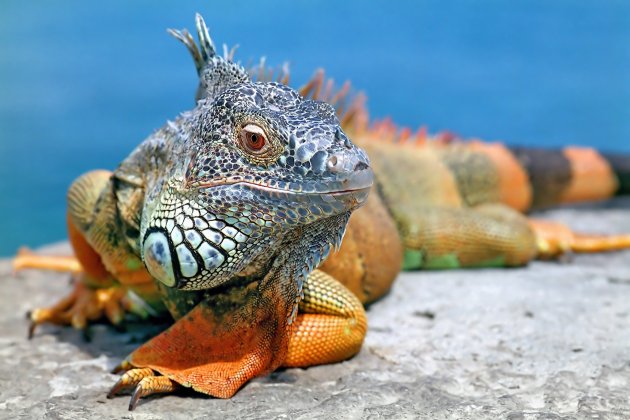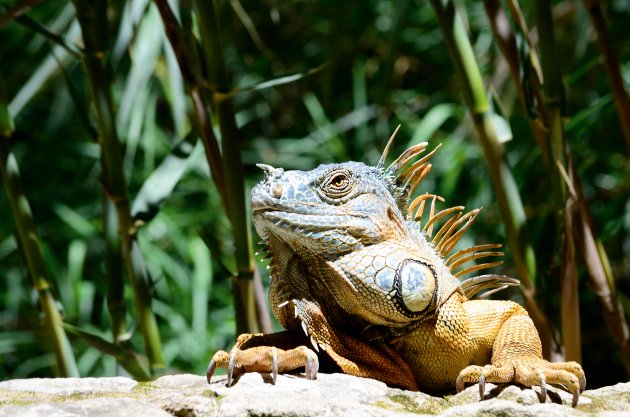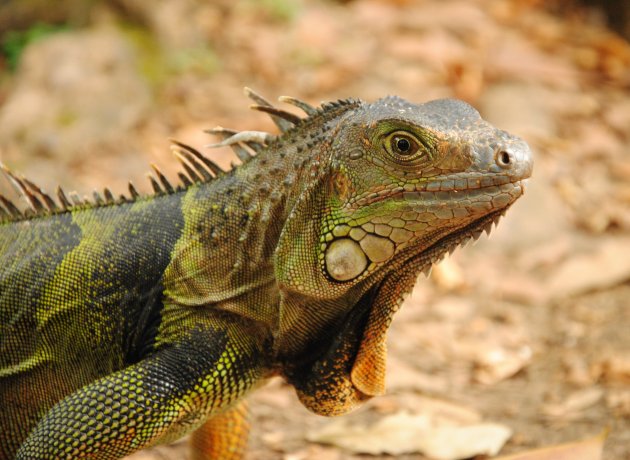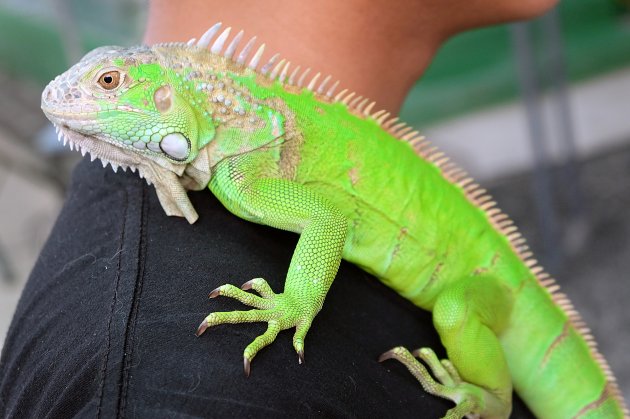Reptile lovers find large lizards particularly appealing. You obviously can’t have a Komodo dragon at home, but, having other kinds of lizards as a pet is close enough! And talking about lizards, Iguanas are a big favorite among pet lovers for many reasons.
The green iguana, specifically, has become a popular pet even beyond their natural habitat. These beauties are natural from tropical areas like Central and South America; if you live in the area, it will be easy for you to obtain one! Of course, before thinking of acquiring one, you probably prefer to know the pros and cons of having an iguana as a pet. Here at Pet Comments, we’ll share with you the pros and cons of keeping a green iguana as a pet.

Pros
The pros of having a pet green iguana are discussed in detail below.
Lifespan
This large lizard can live up to 20 years in captivity, for loving owners, this is an absolute pro! Naturally, like any pet, iguanas need good care in order to live so long. Of course, such a long-lived pet will require a high level of commitment on your part.
Easy to meet diet
If you don’t like your salad, you can give it to your pet iguana, and it will be grateful to you. Iguanas in the wild eat leaves, fruits, flowers, and vegetables; and this completely herbivorous diet must be replicated in captivity.
Their diet will depend on how old they are. Young iguanas eat more often than fully grown iguanas. Many pet stores indicate young iguanas should eat animal protein, like crickets and other small insects. Wrong!
Iguanas (no matter how old they are) are not equipped to process animal protein at all. To include animal protein in the iguana’s diet can result in kidney disease; adult iguanas eat less often than young iguanas.
In the wild, iguanas don’t drink much water because all the greens they eat and their environment has sufficient humidity to keep them hydrated. In captivity, iguanas must have clean and sufficient water for them to drink.
For a more precise diet-regime for your pet iguana, we recommend you seek out your vet for recommendations.
Strong build
Iguanas are not delicate at all! If anything, they look like tiny dinosaurs. They have strong jaws with sharp teeth. Their Godzilla-like-look is complete with long and sharp claws plus a long, yet strong tail.
If you keep your iguana in an outdoor enclosure (if your home size and the weather allow it) you can leave it alone as they don't get hurt easily. Iguanas love to climb trees; they can even fall from 40 to 50 feet high and land without injuries.
If iguanas’ strong and agile capacities appeal to you, then this is the pet for you.
Iguanas are diurnal
If
you love watching iguanas, it is best if they are awake at the same
time that you are, right? Iguanas are diurnal creatures; they are up
and ready with the rise of the sun. In fact, iguanas love the sun so
much that they stay whenever they can get the most out of the UV
rays. In the wild it is easy to find them taking in the sun, high on
a tree branch.
Iguanas
are amazing creatures to watch, they have their very own particular
way of communicating with you, and with other animals around them.

Cons
Size
Iguanas are one of the largest lizards in America. They can measure from 50 to 72 inches long, from the tip of the head to the tip of the tail. An adult male green iguana can weigh as much as 20 lb. Many reptile enthusiasts prefer green iguanas because of their large size, while others find this to be a con.
Iguanas’ large size forces pet owners to acquire large tanks or terrariums to fit that long tail. Iguanas reach their maximum length at seven years old, therefore, don't be fooled by that tiny looking iguana at the pet store! There are no small iguanas; they all grow to be large lizards. If you don’t have a terrarium big enough for a fully-grown iguana, don’t get one.
To be happy and comfortable, iguanas need space to move, stretch, and turn with ease. Like other lizards, they need a water pot deep and large enough for them to soak in. Hence, if you lack the space in your home to accommodate this large lizard, you better go with another choice of pet.
Look, don’t touch!
There are plenty of reptiles with loving, affectionate and also fun personalities… Iguanas are not the case. For starters, iguanas don’t like to be touched. You can train them to TOLERATE touch, but they don’t really like it.
Experienced iguana owners have noted that their pet iguanas close their eyes when they pet them, but this is not because they like being pet. Iguanas often close their eyes to shut off; this is how iguanas ignore stressful situations, and being pet is one of them. If your iguana starts to open only one eye while being pet, it means it is starting to trust you more. If it keeps both eyes open, it is a good sign.
Iguanas have a strong sense of self-defense, because of this it is not rare for them to be wary of you or anyone around them. The major part of the iguana’s length is in their tail. If someone tries to grab them by their tail or they feel threatened; they use it as a whip to protect themselves.
If you can’t help but cuddle your pet, exercise caution with the iguana and earn their trust. It can take you days, months, or years even, it all depends on the iguana’s personality. If you find it too hard, you can always get a more docile lizard, or you know…a dog.
Health
Iguanas demand constant care and attention. Because of their sturdy looks, people can forget iguanas have their fair share of health issues.
Green iguanas’ skin is of a bright green color when they are young (thus, their name right?). The green color gets darker and darker as they age. A fully grown iguana should have a healthy grayish color; any drastic or notable change from their natural color could mean the iguana is sick.
Captive iguanas often develop a disease called Metabolic Bone Disease; this disease makes their bones weaker, provokes deformities and early death. The reason behind this disease is not providing enough UVA and UVB light to the iguana. With these components of natural sunlight, the iguana can manufacture vitamin D3 and metabolize calcium. There are special UV bulbs in case natural sunlight is not an option.
Respiratory infections are also not uncommon to captive iguanas. This happens when the temperature in their tank is not the best for them.
There are other health concerns regarding iguanas, and loving owners must pay close attention to their pet iguana in order for the pet to have a long and happy life. If you don’t have the time or the money to concern yourself with these issues, then pet iguanas are certainly not for you.
Expensive to accommodate
Obtaining an iguana is not complicated or expensive at all, because of how popular they have become, it is very easy to get one. But, housing an iguana is not easy. For example, they need precise living arrangements in order for them to last many years and have a healthy life.
Iguanas need a terrarium wide enough to fit the large size they will eventually have; they also need special lighting, humidity, and temperature conditions. Not to mention all the expensive visits to a vet specialized in exotic animals.
If you believe you will have a difficult time maintaining an iguana for the next 20 years, you better get a different pet.
Housing an iguana
This point is somehow connected to the previous one. Iguanas can grow to be 72 inches long and pet stores rarely have a tank or terrarium large enough for your iguana to turn around and stretch their long tail. Because of this, a safe enclosure for your pet iguana would have to be custom-made.
Like other reptiles, iguanas require controlled UV light, temperature, and humidity in their tank or terrarium. This is vital for their well-being, as not having the correct temperature could result in your iguana losing fingers or even their tail. As cold blooded animals, they require warm temperatures to survive.
Iguanas love to climb; this is one of their favorite pastimes. Their space should be prepared with areas for them to climb and enjoy themselves.
If housing an iguana will become a problem for you or you lack the proper space at home to own one, then a less demanding pet is in order.

NOT for children
Children LOVE to pet animals and carry them here and there. Well, iguanas are NOT for children. Iguanas have strong and sharp jaws, and they bite if they feel threatened. Rapid or sudden moves are sufficient to startle an iguana and children can be restless.
Iguanas’ strong tails can also cause heavy damage if they feel intimidated and decide to attack.
Older kids can be close to the pet iguana under adult supervision and be coached to respect the iguana’s area. Still, if you have children at home, not buying the iguana is cheaper than an ER visit.
Difficult to train
Iguanas
have different personalities; some are more approachable than others.
No matter the iguana, there is one common factor with them…they are
usually hard to train.
To
tame an iguana, you can get them used to be handled since young.
Giving them food with your hand is a good option, too. That way, the
iguana will learn to trust you and know that you mean no harm.
Never
grab an iguana by the tail, if they feel trapped they will just “let
go” of their tail and it won’t grow as long or as pretty as their
original tail was. When carrying an iguana, it must be carefully and
by the stomach, never by the tail.
Training
an iguana can take YEARS if your iguana is particularly stubborn. If
you don’t have the patience to train an iguana for so long, there
are far more docile lizards for you to get.

Do iguanas make good pets?
It
depends. Iguanas can make wonderful pets for the right person.
Iguanas are strictly herbivorous animals, which makes them easy to
feed, but at the same time it is easy to forget they also have
nutritional needs. Inform yourself by a vet about all the diet
requirements for your pet iguana, if you decide to obtain one.
One
of the factors that make iguanas a difficult pet option is that they
are difficult to tame. Being patient, kind, and knowing how to gently
hold your iguana can make a lot of difference in the iguana’s trust
towards you. It is important for a healthy and calm iguana to feel
safe. Any sudden moves, unknown people, and stressful situations can
put your iguana on edge.
Have
in mind iguanas are long-lived lizards, if you are more than willing
to share your space, food, generous portions of your salary with your
pet iguana, and are patient enough to train and tame the most
obstinate iguana ever, then go for it! Iguanas are the right pet for
you!
Conclusion
Iguanas have different personalities, and some are more docile than others. Still, patience is needed when training an iguana. They are beautiful lizards that resemble tiny dinosaurs, and as diurnal animals, you can watch them comfortably. Keeping an iguana is quite pricey though, so be sure to be capable to committing to having an iguana before acquiring one. These are not typical pets, but for the right person, iguanas are the perfect companion.
References and further readings:
- James W., III Hatfield, 2004,Green Iguana: The Ultimate Owner's Manual (buy book)
- Melissa Kaplan, 2000, Iguanas For Dummies (buy book)
- National Geographic, Green Iguana
- PetAssure, Are You Really Ready For an Iguana?